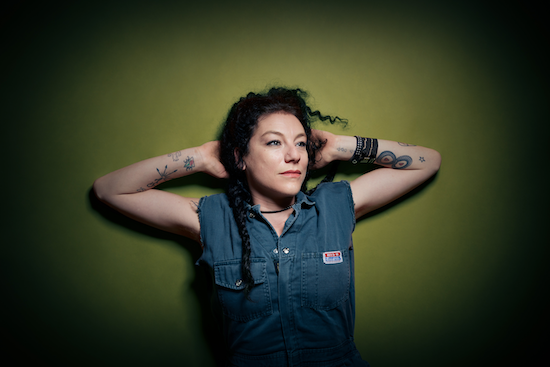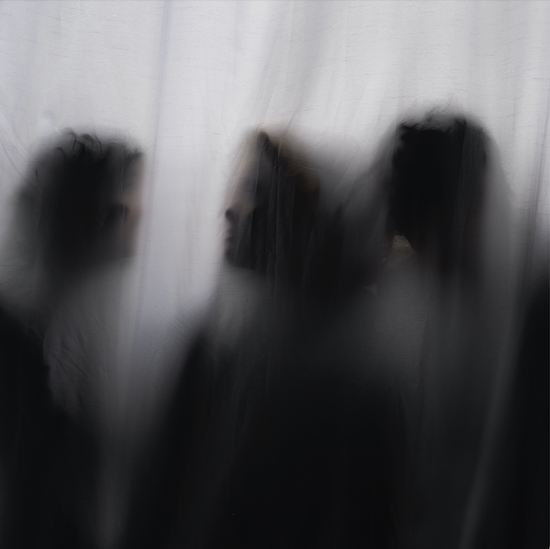BIG|BRAVE self portrait
From September 1 to 3, the mighty Supersonic festival returns to Birmingham, marking its 20th anniversary with a stacked bill topped by the likes of Lankum, Godflesh and Deerhoof.
As any regulars at Supersonic will know, however, there are equal delights to be found away from the headliners. More than perhaps any other festival of its size, it’s an event packed with unexpected one-offs. On the Sunday of this year’s event, for example, violinist Jessica Moss – who emerged from the Canadian alternative scene through her work with Thee Silver Mount Zion Memorial Orchestra and Black Ox Orkestar, and now releases sublime solo work on amplified and processed violin – will join the acclaimed experimental metal trio BIG|BRAVE for a one-off live performance.
With BIG|BRAVE’s slot at last year’s festival being one of the weekend’s standouts, and both them and Moss coming off the back of career-high new albums in the form of nature morte and Galaxy Heart respectively, this show is set to be unmissable.
To get a broader understanding of what exactly to expect from their collaboration, tQ caught up with Moss and BIG|BRAVE over Zoom.
Jessica, I saw your collaborative concert with Matana Roberts at Le Guess Who? 2021. You had both met briefly backstage and played a spontaneous, improvised show. But now you are planning to play a collaborative gig with BIG|BRAVE at Supersonic 2023. You have just had rehearsals. What’s the plan?
Jessica Moss: We’ve known each other for a long time. We met at The Bowery Ballroom in New York when I played with Thee Silver Mount Zion Memorial Orchestra in 2014. Then came a great friendship, musical respect, and a relationship. This led to BIG|BRAVE asking me to play violin on a couple of their records. Robin Mathieu and I are part of an art studio collective in Montreal in one of the last remaining buildings that allow for such things in our city. Supersonic is a unique festival for both of us, me as a solo artist and them as a band. We’ve performed together quite a bit, but it usually was adding a violin to the already existing BIG|BRAVE material. And in this case, we’re doing more of a collaboration in that we’re both bringing elements to the table and working on melding our sounds rather than making additions.
Mathieu Ball: We’re playing some of our songs and some of Jessica’s songs, but at the same time, just reworking everything. It’s more of a collaboration than someone being a guest artist. We are rehearsing – we’re not going to show up and improvise. We’re putting a map together; we have another week of rehearsals. We’re trying to write a unique set for this occasion.
JM: We have the map, and within the map, there’s lots of room for improvisation, which is the best way to do it, [to create] musical trust. We’ll push and pull each other. We’re also including something Mathieu and I did during the lockdown in Montreal – a remote collaboration where we sent each other prompts or ideas. We would record separately and then see what happened when we put them together. And one or two of the things worked out well. Robin’s a great singer, and I’m not, but let’s say, due to Robin’s natural singing, I’m feeling confident and excited to sing loud on stage in a way that I haven’t done since [Silver Mount Zion] and I’m feeling very liberated and excited about that. And nervous.

Jessica Moss by Stacy Lee
Please tell me about your perspectives on each other’s music. Mathieu, Robin, what is the most interesting thing in Jessica’s music?
Robin Wattie: There is the tone and texture of her soundscapes, which feel like emotional, cinematic landscapes, but also there are the type of journeys [her music takes you on] which are captivating, especially when experienced live. Jessica’s music translates so beautifully when played live to the point where it renders me in tears pretty much every single time I experience it. I’ve witnessed people outwardly expressing their emotions, but also there is thought behind everybody’s crying, behind these wet faces. They’re experiencing all of these feelings, but there is also intent that goes into the music. When you look at visual art for example, you can tell when someone has thought about what they’re doing versus creating intuitively. There is such a beautiful balance between the recorded versions and the live versions of her music; there’s something so private and yet so shared simultaneously that it has become entirely dear to me.
JM: Having something like this said to you by somebody who’s a dear and sacred friend is a great feeling. And it’s interesting because I would use some of those exact words to describe the impact of BIG|BRAVE, including extreme and careful thought. I know you guys to be incredibly hard workers, and that’s a starting point in how to relate to somebody as an artist or musician: the amount of absolute dedication to expression and the careful, careful decisions that are made. And this is just talking about their work ethic, which is a baseline in terms of how they approach this weird world that we exist in.
Their work ethic involves performing in front of people. For me, performing in front of people is sacred. So I value, appreciate and feel aligned with how these guys work. On top of that, there’s the dynamic between Robin and Mathieu, who has this incredible work life integration. I know from personal experience how difficult that is to maintain, what a delicate balance it is to be able to continue to do it through thick and thin and how touring can tear you apart on the inside. Their evolution and how hard they’ve been working is beautiful to see. And then on a musical level – sonically – there’s this massive warmth which engulfs you in a deep and measured ocean of sound, with Robin’s voice dipping in and out… it’s ethereal.
RW: Not in that annoying way people say ethereal because of women’s voices. Oh my God…
JM: …but in the word’s true meaning, we both want to use that word as a sacred term. Not in any religious way, but in the way we consider ourselves holy workers in this world. With everything that goes into our work being so difficult, the result is so generous and so complete and holy, it’s a fucking pleasure to join our forces.
How important for you is it that you have known each other for a long time?
MB: Because we know each other so well an opportunity like this is also an opportunity to hang out, which is a significant thing for us. For BIG|BRAVE, it is great to collaborate with new people, but then when you get to play with your best friends, there’s no more excellent thing in the world. And now we get to go to the fantastic Supersonic, and I know we’ll have a great time experiencing the whole festival, and we don’t take that for granted.
RW: It’s important mainly because we don’t often get to see each other. Making friends with musicians sucks because everyone has the kind of schedules that don’t pertain to most [other people], and we miss out on everything. So, when we see each other, it’s like magnets… magnets and glue! It is one of the only ways, other than touring and playing shows together, to spend these chunks of time with the people you love and the family you’ve made through music.
JM: I love that idea of magnets – that’s very beautiful. And it’s true that not many people know this feeling of your life revolving around these outings. You have these moments of intense magnetic feeling, of finding someone who knows what you’re about – it doesn’t happen at home very often. At home, a lot of time is either taken up by recovering or preparing. And for me, it also involves parenting. Even though the three of us live around the corner from each other, and we might as well live in different cities, or that’s how it feels.
This is the 20th anniversary of Supersonic. How do you see the festival, and what do you like about it?
RW: First of all, it’s one of the only events where I feel comfortable entering the festival space as a human regarding how diverse the people attending are. It’s because of how diverse their roster is regarding who they choose to play. But the next most significant thing – which I realised immediately – is how lovely [organisers] Lisa and Rosie are. They’re music fans; they feel like they’re doing this for the love of it, no matter how hard as it is for them to organise. They knew that we loved dogs, so Lisa brought her dog for us to meet, and it felt cozy and friendly. That traditional relationship of promoter and artist disintegrated. Usually, you enter a venue, a show, or a festival, and everyone’s role is relatively straightforward, depending on who you’re meeting; it can be pretty robotic but at Supersonic I felt human; I felt like I could enjoy it myself. I loved the music I got to see. It was cool because it felt like this beautiful big hang but instead of just hanging with musician friends it was also with the festival people that I now also feel are like friends. So that’s also another fun thing.
JM: There’s a general zeitgeist in a festival culture where diversity is essential. But many festivals feel like they’re paying lip service; as if they’re only doing it because they know they should. And maybe it’s a bit competitive: ‘What’s the craziest thing from the craziest place you can get?’ But it is not reflected in the festival administration, the people working there, from the top down. So if everybody working behind the scenes at the festival is a white dude, then no matter how diverse your lineup is, it doesn’t translate. It might translate to an audience member, but it doesn’t translate to the experience of the artists for the most part. Supersonic is a festival where it feels like the dedication to working against what is dominant festival culture is genuine and active and part of the dialogue from the beginning. I think that makes a huge difference.
As does a festival run by female-identifying people from the top down. Also, it’s a different kind of feeling; it is. And nobody’s perfect, but you can only hope that the effort that they make is something that should be held up as a shining example.
RW: Nothing is forced. It’s genuine. They’re making an effort to make it as diversified as possible. It’s a badass festival with a fantastic lineup every year. You go there and forget you’re at a music festival. Last year, we were there all weekend, and it was the best weekend ever. I’ve been following this festival for 15 years. And then when we finally got asked to play, I was like, ‘Fuck, yeah!’ When I got there and met the people, it was like, ‘We’re on the same page.’
MB: That’s why we want to go back every year. It won’t happen, but I’ll just go as an attendee because fuck it, it just rules. Maybe next year, I’ll fly to Birmingham without knowing the lineup. I think you can trust them.
BIG|BRAVE and Jessica Moss play Supersonic 2023 on Sunday, September 3


